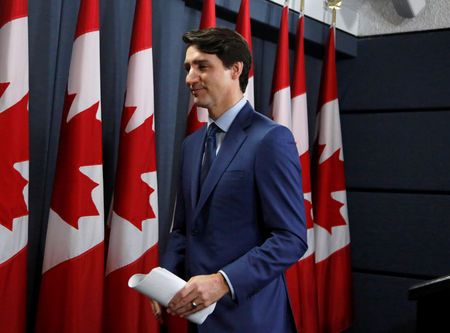
With a federal election looming and Prime Minister Justin Trudeau’s government facing its worst political crisis in four years, Canada’s ruling Liberals are expected to table a goody-filled budget later this week in bid to get back on course with voters.Canada’s Prime Minister Justin Trudeau speaks at a news conference in Ottawa, Ontario, Canada, March 7, 2019. REUTERS/Patrick Doyle
Trudeau’s Liberals surged to power in 2015 on a pledge to jolt the economy by boosting spending, but their popularity has dropped sharply in recent weeks amid claims that Canada’s former Justice Minister was pressured to help construction firm SNC-Lavalin avoid a criminal trial.
Adding to the pain, economic growth slowed sharply at the end of 2018 and, despite blockbuster job gains, Canadians are feeling increasingly pessimistic about the future as record household debt runs up against higher interest rates.
To counter the negative sentiment, Finance Minister Bill Morneau is expected to make use of unexpectedly strong revenues from the first nine months of the fiscal year to table a stimulus-filled federal budget on Tuesday, the last budget ahead of an October election.
High on the list of expectations is supports for millennial home buyers, money for skills re-training, pharmacare help for those lacking prescription drug plans through their workplace, and new spending for families with children.
If Morneau wants to look fiscally prudent, the key will be to divvy up only the unexpected revenue, and not disrupt plans to reduce the net-debt-to-GDP ratio – a measure of how burdensome debt is relative to the economy, said Derek Holt, head of Capital Markets Economics at Scotiabank.
ADVERTISEMENT
“If they want their cake and eat it too, you spend only the unanticipated revenue surprise, and you keep your powder dry on the rest,” he said.
HOUSING FOR MILLENNIALS
New mortgage rules that came into effect last year, and five interest rate hikes by the Bank of Canada since July 2017, have left would-be buyers on the sidelines.
While the central bank says the changes have improved the quality of new mortgage debt in Canada, they have also contributed to a slowdown, with home sales slumping nationwide to a six-year low in February.
“Our recommendations include restoring 30-year mortgages for first-time home buyers and making some adjustments to the current stress test now that the market has changed,” said Kevin Lee, chief executive of the Canadian Home Builders’ Association.
Others options include bigger tax breaks for first-time buyers and more space to borrow from retirement savings.
But economists warn that too many perks could inadvertently reheat housing markets, putting ownership further out of reach for millennials and other first time buyers, especially in expensive cities like Vancouver and Toronto.
PHARMACARE AND MORE
The budget is also expected to propose a limited expansion to Canada’s healthcare system to cover part of the cost of prescription drugs, Reuters reported in January, citing sources.
Budget documents may go into some detail, or just make a general commitment to boost coverage, leaving specifics for the election campaign.
And while one of the bright spots in Canada’s sluggish economy has been booming employment numbers, companies say they are struggling to fill jobs requiring specialized skills, notably in the technology and healthcare fields.
“We would welcome a focus on skills, since it could address a current business challenge,” said Craig Wright, chief economist at the Royal Bank of Canada, in a research note.
Speaking at a shoe repair shop on Thursday, Morneau hinted such measures would be coming.
New Zealand starts to bury mosque attack victims
“In our budget this year, that’s what we’re going to be thinking about. How do we help Canadians to take time off … and how do they pay for their training?” he said.
The Liberals have faced criticism for backing away from a pledge to balance the budget by 2019, but with a vote looming the focus will likely be on setting up the campaign platform with items to come. A deficit of C$18.1 billion ($13.6 billion) is forecast for 2018/19.
“When it comes to how the deficit gets allocated, as we saw in the last election, (voters) still like to see a check in their own mailbox,” said Avery Shenfeld, chief economist at CIBC Capital Markets, in a research note.
OTTAWA (Reuters) –
